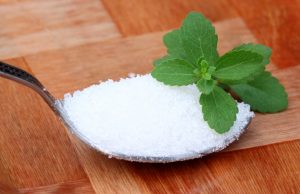 With all the health issues that sugar may bring, finding a safe alternative – or avoiding it altogether – is necessary. It seems we all have a sweet tooth to some degree, but no one wants to develop diabetes, gain weight or have other health concerns. There are artificial sweeteners on the market but those, too, have pressing evidence against them as harmful to our health.
With all the health issues that sugar may bring, finding a safe alternative – or avoiding it altogether – is necessary. It seems we all have a sweet tooth to some degree, but no one wants to develop diabetes, gain weight or have other health concerns. There are artificial sweeteners on the market but those, too, have pressing evidence against them as harmful to our health.
So then what are we left to do, never to enjoy a little sweet indulgence again?
Advertisement
Not necessarily. Not entirely new, but probably the most natural form of sugar out there, stevia is holding much promise in the realm of sweetness.
What is stevia?

Stevia sugar comes from a plant related to the daisy and ragweed. The stevia plant can be most commonly found in New Mexico, Texas and Arizona. The best form of stevia, Stevia rebauiana, can be found in Brazil and Paraguay, and for hundreds of years natives have used it as a natural sweetener.
With more and more Americans making the switch away from sugar to other sweetener options, the need for something like stevia is quite high. Estimates suggest that in 2012 the sugar substitute market was worth $10.5 billion.
How does stevia work?
 What exactly makes stevia a better option? Well for one, it has zero calories and second, it is much sweeter than regular sugar – meaning you can use much less for the same taste. Better yet, stevia sugar is all-natural so concerns of ingesting something that is artificial are out the window.
What exactly makes stevia a better option? Well for one, it has zero calories and second, it is much sweeter than regular sugar – meaning you can use much less for the same taste. Better yet, stevia sugar is all-natural so concerns of ingesting something that is artificial are out the window.
When it comes to sweeteners it can get quite confusing as to which one to have, so let’s examine stevia sweetener in comparison to other commonly used sweeteners.
Stevia versus other sugar substitutes

There are many reasons why someone may be looking for a sugar substitute. Because we know the detrimental effects of sugar, we may want to wean ourselves off of it, or at least find less harmful ways to sweeten our favorite foods.
As we mentioned, there are many ways to achieve sweetness whether through natural means, artificial sweeteners, sugar alcohols and novel sweeteners.
Natural sweeteners: Agave nectar, date sugar, fruit concentrates, honey, maple syrup, molasses.
Artificial sweeteners: Asparatame, neotame, saccharin, sucralose.
Sugar alcohols: Maltitol, lactitol, sorbitol, xylitol.
Novel sweeteners: Stevia, tagatose, trehalose.
As you can see, some of these sweeteners are found naturally, others are extracted from sugar and others are man-made. Because artificial sweeteners offer no additional calories, they appear to be the ideal option for those looking to cut out sugar while not sacrificing sweetness.
Artificial sweeteners have been suggested as a good option for people with diabetes and those who need to manage their weight. Although sufficient evidence isn’t quite there yet to prove this, as long as you have the OK from your doctor to try these options, then you should be fine.
On the other hand, research has come out against such sweeteners like aspartame – most commonly found in diet sodas – as being harmful. Essentially, when it comes to sugar and sweetness, everything in moderation. Even too much sweetness is bad for you!
Is stevia FDA approved?
The U.S Food and Drug Administration (FDA) has its own take on sweeteners. The FDA has not approved the use of whole-leaf stevia or crude stevia extracts. There have been concerns surrounding these items, such as their effect on blood sugar, reproduction and cardiovascular health. Because there is not enough data to support these forms of stevia the FDA cannot approve them.
What the FDA does allow for is the use of a chemical from the stevia additive, deemed safe for consumption. It’s that isolated chemical which you find in stevia sweeteners and products like Truvia.
Is stevia safe to use?
High purity stevia generally is safe to use, but may be detrimental for the individual. For example, reports that stevia can lower blood pressure means someone who already has low blood pressure shouldn’t take it, or at least have it in high amounts. But as long as you’re fairly healthy and don’t have a preexisting medical condition which would deter you from taking stevia sugar, stevia is safe for consumption. In fact, many major regulatory organizations around the world have approved stevia sugar.
Currently countries like Australia, China, Russia, Colombia, Peru and Brazil all allow the use of stevia as a food ingredient. High purity stevia has been deemed safe and studies in regard to side effects of stevia sweetener resulted from tests that examined whole-leaf stevia – which the FDA has disapproved.
The No. 1 rule when it comes to enjoying anything in life is moderation. If you’re using stevia as a sugar replacement, just be cautious and remember it is much sweeter than regular sugar, so less is definitely more. Also because stevia sugar is so sweet, it can easily be used to create stevia recipes. Anytime something you’re making calls for sugar, just swap it out for stevia sweetener, but remember to use less!
If you’re concerned about stevia, or any sugar substitute, speak with your doctor to see what your options are. Making healthy sugar swaps can be as easy as using fruit or honey!
Advertisement
Related Reading:
Hypoglycemia: How low is your blood sugar?
When it comes to the early signs of hypoglycemia, and what causes hypoglycemia, diabetics already have an understanding of the condition. They know they have to keep their blood sugar in the healthy range because their body either can’t produce insulin (type 1 diabetes) to handle sugar in the body, or they can’t use insulin effectively.
Easy way to cut down on hidden sugar
Undeniably, sugar is everywhere. It seems impossible not to consume sugar at any given moment. From naturally occurring sugar found in fruits to artificial sugars that can be found in junk food and soft drinks, we are living in a sugar-induced society.
